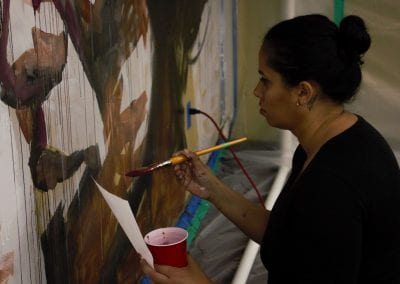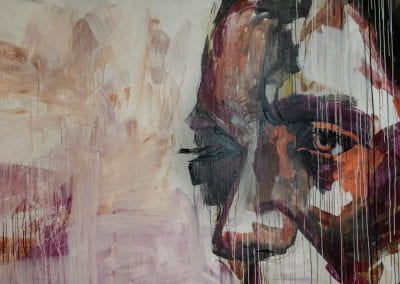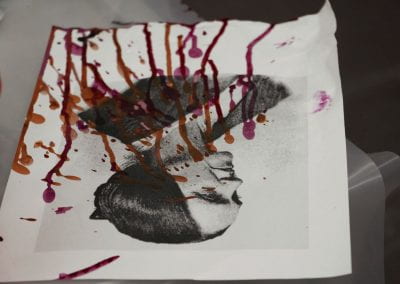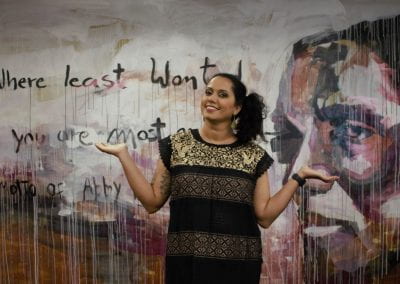Artist-In-Residence: Panmela Castro
Presented by the Global Lab
TRIGGER WARNING: This page includes images and videos of Panmela Castro’s art, which some viewers may find upsetting.
During the week of September 16 – 20 2019, WPI hosted its second Arts and Sciences Week, organized by the School of Arts and Sciences along with other partners on campus. One of the featured guests at this event was Panmela Castro, a grafiteira and performance artist from Rio de Janeiro. Her work focuses on female empowerment and destigmatizing the role of women in society. Panmela spent several days on campus and engaged with the community in several ways, including painting a mural of Abbey Kelley Foster, a prominent suffragist and women’s rights advocate from Worcester, and speaking about the events that led her to the path of activism through art.
She started her talk by telling the story of her time cohabiting with her boyfriend. She was 24 at the time, and at first things were going well. However, Panmela slowly started noticing a change in his behavior: he started accusing her of not taking care of the house, not washing the clothes properly, or not cooking well. She would brush these comments off as being normal. It was not long until abusive words turned into abusive action. Her boyfriend would force her to take ice cold showers, or even try to set her on fire. Panmela’s boyfriend would call in sick for her and remove all her means of contact with the rest of the world, meaning she could not ask for help. At the time she did not know the extreme effects these events where having on her, attributing her lack of reaction to the fact that women in Brazil are taught to endure behavior of this kind. Looking back, these events had a heavy impact on her. “I was destroyed”, she told the audience.
Panmela found an opening when her boyfriend one day forgot his phone at home. She took this opportunity to call her mother, who came to take her away from the house and cared for her.
Her mother encouraged her to go to the police station, saying “Panmela, you have to tell your story. Don’t be shy, tell your story!” Panmela decided to follow her mother’s advice and confess to the police, but the effort was futile. The police did nothing because, as Panmela stated in her talk, “this was not considered a real crime in Brazil”. It was during this time that she decided she wanted to fight to improve laws on violence against women, using the only tool she possessed: her art.
She created an organization called Rede NAMI, which focuses on educating women and girls about domestic violence. With the organization, she started going to schools and various communities to spread this message. While working with Rede NAMI, she noticed that even within her world of graffiti stigmas around women empowerment were strong. To give the audience an idea of the disparities in the world of graffiti, Panmela pointed out that a 2015 she attended that gathered all the most prominent graffiti artists in Brazil brought together 700 men and only 15 women. Not only that, but black women were not represented at all. This urged her to launch a street art program targeted towards women of color living in the peripheries, expanding the scope of her work from simply awareness of domestic violence to fighting for equality across all genders and races.
Panmela continued her talk by reiterating that she picked this method of activism because she knew she was good at expressing herself through art. In the last year alone, 350 people in Rio de Janeiro died of femicide – the taking a human life because of the simple fact the person is a woman. Statistically, one woman dies every five days. This cause is close to Panmela’s heart, and she has devoted herself to contributing to it in any way she can. She finalized her inspirational speech by urging everyone in the room to use the tools they possess and the talents they have to impact causes they are passionate about and make change in the world.
Below are pictures of Panmela’s mural at WPI.






